The Persecuted Rohingya Are Fleeing Into Bangladesh
On a forgotten people
Ulet Ifansasti / Getty
The persecuted Rohingya are being driven from their homeland. They flee Myanmar, and end up in Bangladesh. Now the government there wants to force them onto an easily-flooded island. Where will they lay their head?
The Rohingya are a minority in Myanmar, Muslims in a Buddhist-majority country. They are persecuted by their government, told they do not belong in their own land. A long-lasting wave of persecutions drove them into contained refugee camps. The current pogrom came after a few Rohingya committed a violent act.
After enough state brutality, a few violent Rohingya attacked a guard post, killing twelve people. That was the moment that the elites had wanted. They had the guns and clubs. All they needed was a legal precedent. The government used this as an excuse to harry the beleaguered people into more misery. That is the current state of play. The Rohingyas’ homeland, Myanmar (formerly known as Burma), does not recognize their basic human rights. They do not possess citizenship in their own country.
Per the Times:
Myanmar’s military appears to have resumed scorched-earth tactics against Muslim Rohingya that were of such “devastating cruelty” last year, according to the United Nations, that they most likely constituted “crimes against humanity.”Tens of thousands of desperate Rohingya are fleeing Rakhine State, where a government operation began after attacks by the insurgent Arakan Rohingya Salvation Army on Aug 25. Since then, Myanmar’s military reports nearly 400 people have been killed, mostly insurgents, but Rohingya reaching Bangladesh report widespread atrocities by the military, including deliberate killings of civilians. The insurgents said they were reacting to abuses by the military, which reportedly moved a battalion into the region about a month ago, prompting concern from the United Nations about the Rohingya’s fate.
-

-

-

-

-

-

-

-

-

-

-

-

-

-

-

-

-

-

-

-

-

-

-

-

-

-

-

-

-

-

-

-

-

-

-

-

-

-

-

-








































